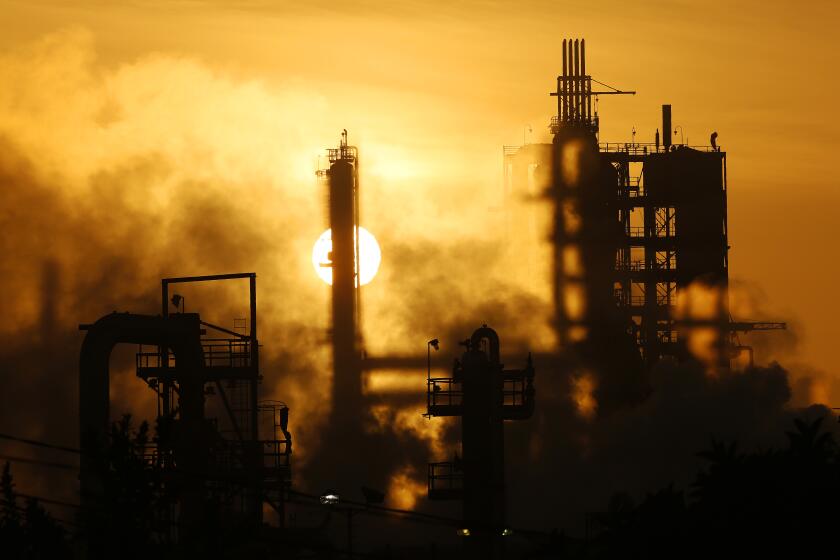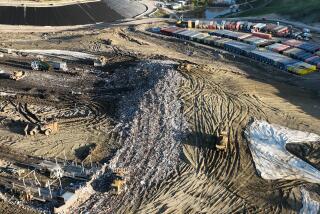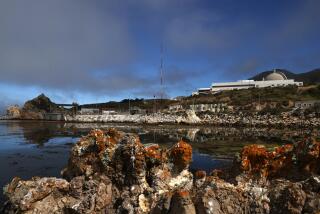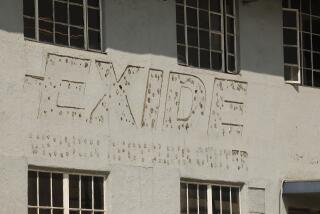Cleanup to resume at troubled Santa Susana Field Laboratory site
After more than a decade of delays, the U.S. Department of Energy said it will soon resume environmental cleanup at a former nuclear and rocket engine test site in the hills of Ventura County.
On Wednesday, the DOE and the California Department of Toxic Substances Control announced a consent order to demolish 10 government-owned buildings, including several of the most contaminated, at the Santa Susana Field Lab outside Simi Valley.
The sprawling test site covers 2,850 acres and was instrumental in the development of the Apollo and space shuttle programs. In 1959, it was the scene of a nuclear accident ,and more recently it was the ignition point for the 2018 Woolsey fire, which caused devastation in both Ventura and Los Angeles counties.
A move to streamline construction of seawalls in Orange and San Diego counties would doom public beaches, environmentalists say.
“Under President Trump’s leadership, the Department of Energy is committed to making real and significant progress to meaningfully address the environmental legacy challenges from decades of Cold War era government research,” said U.S. Secretary of Energy Dan Brouillette. “This agreement is an important step that demonstrates how DOE and California can collaborate to bring the ETEC site to its final cleanup and completion.”
ETEC stands for the Energy Technology Engineering Center, a specific government-owned property within the larger field lab that developed technology in support of the U.S. nuclear and space programs during the Cold War.
“Today’s actions to clean up this toxic site are the result of a critical partnership between California and the U.S. Department of Energy that greatly benefited from the personal involvement of DOE Secretary Dan Brouillette and former Secretary Rick Perry,” said California Gov. Gavin Newsom. “The surrounding communities have waited a long time for decisive action at the Santa Susana Field Lab and today’s order represents a new and important chapter toward the full cleanup.”
Our oceans. Our public lands. Our future.
Get Boiling Point, our new newsletter exploring climate change and the environment, and become part of the conversation — and the solution.
You may occasionally receive promotional content from the Los Angeles Times.
The 10 buildings slated for demolition comprise the former Radioactive Materials Handling Facility complex, used for the processing, packaging and shipment of radioactive and mixed hazardous wastes. The buildings became inactive from 1999 to 2001.
“The DOE will dispose of building demolition debris at licensed and permitted disposal facilities outside the state of California,” the agency said. “DOE will continue to work with the state toward processes to remove the remaining DOE-owned buildings, and toward cleanup of soils and groundwater at the site.”
Powerful industries are pressuring California regulators to delay or roll back air quality and climate regulations due to the COVID-19 pandemic.
“This is a significant step forward in the cleanup of this important site,” said California Environmental Protection Secretary Jared Blumenfeld. “We share this community’s concern regarding the possible release of contamination from this area, and credit the federal Department of Energy for working collaboratively to remove the buildings and complete this action.”
State officials said the consent order was in keeping with efforts to prevent and mitigate the impacts of wildfires. In the event of a fire followed by heavy rain, the deteriorating buildings could potentially release contamination that could migrate off site, officials said. This interim action will result in the removal of the above-ground portions of the buildings.
The DOE is one of three responsible parties for the cleanup at the field lab. Boeing owns most of it, while NASA also owns a portion.








